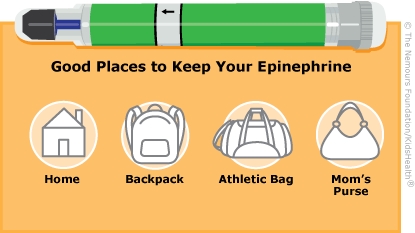After an Allergic Reaction: How to Care for Your Child
Allergic reactions can range from mild to severe. A future reaction could be severe, even if a child has only had a mild reaction before. So it's important to be prepared and know how to handle reactions.


When You Get Home:
Safety Planning:
-
Avoid any known causes of your child's allergic reaction. For example, in the case of a food allergy, completely avoid the food that caused the reaction and anything that could be cross-contaminated with it. Wash your hands well, and keep utensils and surfaces used to prepare foods clean.
-
Ask the health care provider for an allergy action plan. Give copies of the plan to teachers and other care providers. Make a plan for meals, field trips, art projects, and other situations where your child might be in contact with things he or she is allergic to.
-
Your child should wear a medical alert ID bracelet with his or her name and known allergies. You can buy one in a drugstore or online.
Epinephrine:
-
If the health care provider prescribed epinephrine auto-injectors, keep two with your child at all times, including at school, childcare, and activities. Make sure the auto-injectors have not expired, and don't leave them in cars or other places where they're exposed to heat, cold, or sunlight.
-
Immediately use the epinephrine auto-injector if your child shows signs of a severe allergic reaction, such as:
-
After using epinephrine, call 911.

-
Your child has side effects from any medicine taken for the allergic reaction.
-
You have questions about what your child can eat or drink.
-
You have any questions about the allergy action plan.
-
You're not sure how or when to use the epinephrine injector.
-
Your child is injected with epinephrine by accident.

-
Have someone call 911 while you give the epinephrine. If you're alone, give epinephrine first, then immediately call 911.
-
Lay your child down with his or her legs raised while you wait for the ambulance.
-
Take the used epinephrine auto-injector with you to the ER.


What is an allergic reaction? An allergic reaction happens when the body's immune system thinks a substance (called an allergen) is a dangerous invader. The immune system goes into "overdrive," causing an allergic reaction. Some common allergens are animal dander, insect stings, foods, pollens, plants, and medicines.
What happens during an allergic reaction? When the body tries to "defend" itself against an allergen, it releases certain chemicals, such as histamine. These cause allergic symptoms that can affect the skin, the digestive tract, breathing, and blood circulation. Some reactions may be mild and only involve hives, itching, stuffy nose, or watery, red eyes.
What is anaphylaxis? A severe allergic reaction is called anaphylaxis. Anaphylaxis can begin with symptoms of a less severe reaction, but it can quickly get worse, leading to trouble breathing or swallowing, or a loss of consciousness. If not treated, anaphylaxis can cause death.
Some kids who have had allergic reactions are at risk for anaphylaxis. If your child is at risk, your health care provider told you this and prescribed epinephrine auto-injectors.